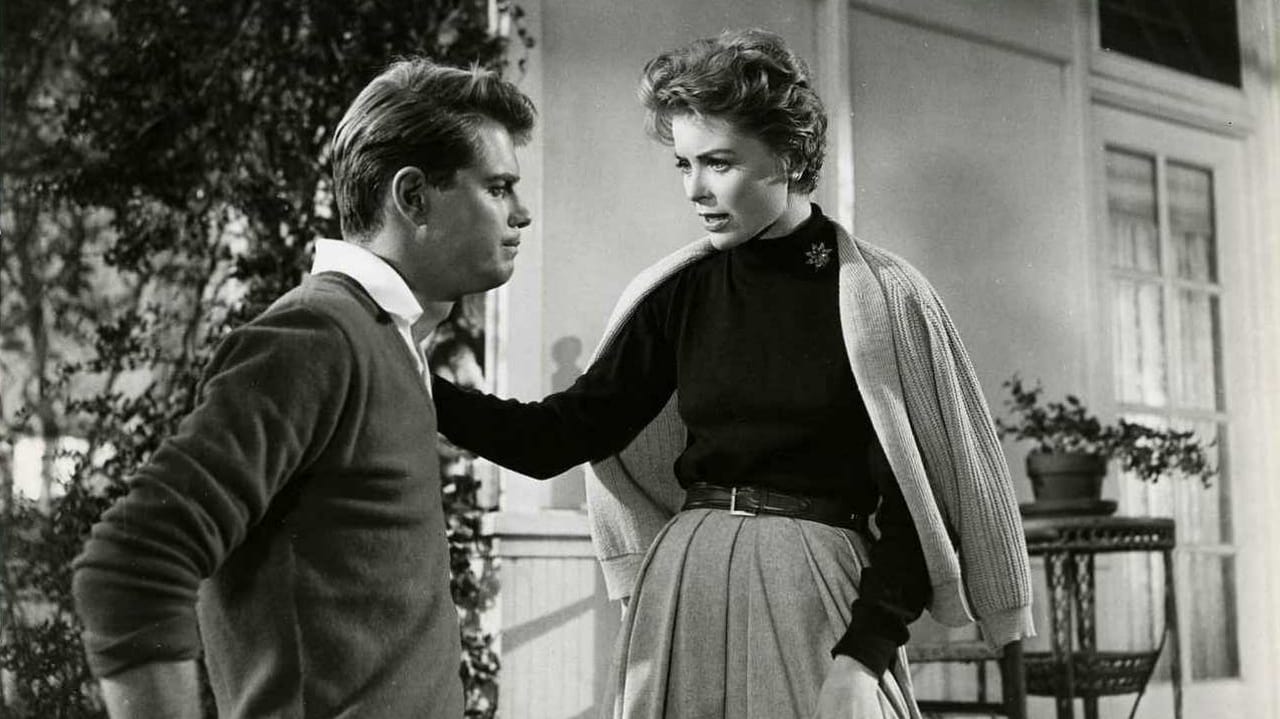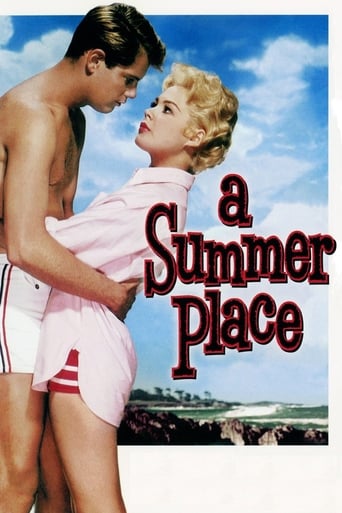

Waste of time
... View MoreSadly Over-hyped
... View MoreIt’s an especially fun movie from a director and cast who are clearly having a good time allowing themselves to let loose.
... View MoreIt's a mild crowd pleaser for people who are exhausted by blockbusters.
... View MoreWith the '50s coming to a close, audiences were probably looking for a movie to break away from the decade's repressed mores. Boy did they get one! "A Summer Place" contains what were probably some of the most candid discussions of sex to grace the silver screen up to that point (by which I mean that the words "sex" and "pregnant" get used in the movie). But more importantly, the movie hints at what "The Graduate" would deal with head-on less than a decade later: the hypocrisy of the parents' generation. The parents act like nice, upstanding members of the community, while in reality they're a bunch of cold, spiteful individuals (not to mention bigoted; one of them doesn't want to be around "Jews, Catholics, Italians, Poles, French, Germans, Blacks, Latinos or Asians")*.Obviously it was still going to be a few years before cinema could deal with these issues directly. But for a movie to even mention sex, adultery and divorce in the oh-so-wholesome Eisenhower era was a major leap (at least for 1959). As for Sandra Dee, it's understood that she usually got cast in "cute" roles. I bet that if the executives hadn't tried to control her career so much, she would've graduated to serious roles. Who knows? She just might have become her generation's Meryl Streep. From what I've read about her, she was smarter than these ingenue roles implied (as she put it, she soon figured out that the producers just considered her a piece of property). It was probably some consolation to her that San Francisco's Castro Theater held a retrospective of her movies in 1998, which she attended as guest of honor.*"Dirty Dancing" also addressed this, showing how the supposedly liberal parents didn't want their daughter to associate with the "wrong" kind of people.
... View MoreI saw A Summer Place for the first time very recently, and one thing that really struck me was just how gutsy Constance Ford's portrayal of Helen Jorgenson was. Not many actors can pull off a character who has absolutely no redeeming qualities whatsoever. Most actors would pressure the director and writer into giving their characters at least a small bit of sympathy, but Ford was excellent at playing someone thoroughly bad. I'm sure she got static for her portrayal when she visited the supermarket or whatever in her daily life.I'm not kidding, Bruno Ganz' portrayal of Adolf Hitler in Der Untergang/Downfall was more sympathetic and likable than Constance's portrayal of Helen.
... View MoreI read through some of the reviews here on IMDb, and I lament that I was a little too young when this film came out to remember all the hoopla surrounding it. I have a vague memory, but that's about it."A Summer Place" was released in 1959 and stars Troy Donahue and Sandra Dee as Johnny and Molly, who meet and fall in love when Molly's family comes to stay at his parents' guest house in Pine Island, Maine during the summer. Dorothy McGuire, Arthur Kennedy, Constance Ford, and Richard Egan are their mismatched, dysfunctional parents.The best roles belong to Ford and Kennedy. Ford, as Molly's mother, is a disapproving, strict woman who seems to be against sex but sees it everywhere. And though she doesn't admit it, she's fascinated by it. When Molly comes home after she and Johnny are shipwrecked overnight, her mother calls a doctor to have her examined and make sure she's still a virgin.Molly's father is played by Richard Egan, and he and Ford seem completely mismatched. He is gentler and more understanding...and has been in love with Johnny's mother Sylvia (McGuire) since he worked on Pine Island as a lifeguard twenty years earlier. Sylvia, married to the drunken, bitter Bart (Kennedy) has always been in love with him, and the two almost immediately rekindle their romance. This leads to a lot of turmoil between the families and Helen particularly wants Johnny and Molly apart.It's easy to see why teens loved this back in the day with the family problems, attempts at keeping the two lovers apart, and the good old how far shall we go discussion, not to mention all the romance.Troy Donahue -- his run as a teen idol was a bit before my time -- I probably missed his peak by two years. I did watch his TV shows but I don't remember him, only Edd Byrnes, Connie Stevens, Efrem Zimbalist, Jr., and Roger Smith from the various shows. And that was Troy's problem. Hunky good looks but ultimately forgettable with his monotonous line readings and facial expressions, and general stiffness. Besides his looks, the only thing he had going for him was a nice speaking voice. Sandra Dee fares better. She was a natural actress and often called up to be emotional, so she had a wider range. She and Donahue are very cute together.Ford and Kennedy both do excellent jobs; Egan and McGuire have much less to do. McGuire and Donahue were two Delmar Daves regulars, which is why when you look at a description of the movies, you're not sure which ones you've seen.Max Steiner wrote the beautiful theme for the movie (which he originally wrote for High Noon) which one still hears played today. It's a good match for the film.Delmar Daves' films are generally on the long side but the soapy films he made in this period are beautiful to look at. And his message is great about love and a sense of humor -- "These are the weapons of the angels."
... View MoreIt's easy to mock this big tub of soap suds. What with the two baby-faced innocents and a ton of Dee's pouty close-ups, it's a generous slice of white bread, 50's style. But beneath all the teen-age angst and adult philandering lies a surprisingly subversive message for that uptight decade. Because, once things get sorted out over the 130 minutes, we find out a number of social rules have not only been broken, but their violation justified. For example: the storyline implies that teen sex may be okay as long as the kids truly love each other— a violation of the teenage abstinence rule; that unwed teen pregnancy need not be punished— a challenge to Production Code insistence; and that adultery may be okay if the spouses are in impossible marriages—a further erosion of that seemingly sacred institution. The overall idea, is that no matter what, true love forgives all.Now, this may seem pretty tame stuff 50-years later in our anything-goes era. But I guarantee, it was cutting edge Hollywood at the time, even if the messages were buried in a load of glossy make-believe. Responding to the slick package were lines of teens stretching around the block, and it wasn't just because of the catchy title tune. Then too, those folks curious about the breakdown of 50's conformity and the youth rebellion of the 60's should include this highly unexpected entry in their thinking.At the same time, writer-director Daves seems an unlikely source for both the message and the genre, with his background in adult Westerns, such as the classic 3:10 to Yuma (1957). Here, he's very shrewd in his casting of Hollywood veterans. There's the likably masculine Egan (Ken) and the saintly maternal McGuire (Sylvia). Between them, they make infidelity seem not only permissible, but required. Then there's the affably tipsy Kennedy (Bart) and the assertively witchy Ford (Helen). Between them, they make cuckolding seem not only permissible, but also required. Taken together, it's almost perfect type casting. My only reservation is with Ford who seems too aggressively mean to make her marriage believable.Daves is also a sneaky filmmaker since he wraps the controversial subtext in irresistible gloss. Few pictures of the era are as gorgeous as this one, and I'm not just talking about Donahue (who's even prettier than his co-star). Those Technicolor shots of the Carmel coastline are mesmerizing, along with the Lloyd Wright cliffside house. For visual contrast, compare this production with the thematically similar but dour-looking Blue Denim of the same year and also with two blonde innocents-- Brandon deWilde and Carol Lynley. The black&white Denim is the more earnest of the two, yet lacks the candy-box covering that giftwraps this production. Thus, for all its seriousness, Denim lacked the same teen drawing power and impact.Anyway, as mentioned, mocking the film is easy, what with all the soapsuds and two Photoplay leads. However, I salute Daves for knowing how to get his humane message across to a popular audience, despite providing grist for generations of smirking critics. Happily, Daves proves here that there was more to his filmmaking than a fast gun, Glenn Ford, and a slow train to Yuma.
... View More